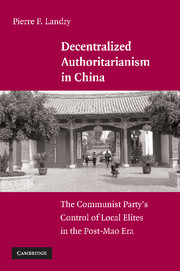 Decentralized Authoritarianism in China
Decentralized Authoritarianism in China Book contents
- Frontmatter
- Contents
- List of Tables
- List of Figures
- Acknowledgments
- List of Abbreviations
- Decentralized Authoritarianism in China
- 1 Authoritarianism and Decentralization
- 2 Organizing Decentralization
- 3 Promoting High-Level Generalists: The Management of Mayors
- 4 Organizational Power: The View from Within
- 5 Explaining Cadre Rank
- 6 The Impact of Village Elections on the Appointment of Party Branch Secretaries
- 7 Conclusion
- References
- Index
7 - Conclusion
Published online by Cambridge University Press: 22 July 2009
- Frontmatter
- Contents
- List of Tables
- List of Figures
- Acknowledgments
- List of Abbreviations
- Decentralized Authoritarianism in China
- 1 Authoritarianism and Decentralization
- 2 Organizing Decentralization
- 3 Promoting High-Level Generalists: The Management of Mayors
- 4 Organizational Power: The View from Within
- 5 Explaining Cadre Rank
- 6 The Impact of Village Elections on the Appointment of Party Branch Secretaries
- 7 Conclusion
- References
- Index
Summary
The logic that places organizational policy at the apex of the CCP's political strategy is best summarized in remarks attributed to Deng Xiaoping during his famed “southern inspection tour”:
[We] must educate the army, persons working in the organs of dictatorship, the Communist Party members and the people, including the youth. If any problem arises in China, it will arise from inside the Communist Party. We must keep a clear head. We must pay attention to training people, selecting and promoting to positions of leadership persons who have both ability and political integrity, in accordance with the principle that they should be revolutionary, young, well educated and professionally competent. This is of vital importance to ensure that the Party's basic line is followed for a hundred years and to maintain long-term peace and stability. It is crucial for the future of China
(Deng, 1994: vol 3, 368).THE CCP'S ADAPTATION TO EXTENSIVE DECENTRALIZATION
The 1990s were a decade of extraordinary change in China's localities, including the counties surveyed in the Jiangsu Elite Study. The acceleration of reform after 1992 worsened preexisting economic disparities between Northern and Southern Jiangsu, but from the standpoint of Party officials concerned with building legitimacy, rapid expansion in the Sunan counties surveyed here is evidence of effective governance and adaptability of local institutions to changing economic incentives.
- Type
- Chapter
- Information
- Decentralized Authoritarianism in ChinaThe Communist Party's Control of Local Elites in the Post-Mao Era, pp. 257 - 268Publisher: Cambridge University PressPrint publication year: 2008
